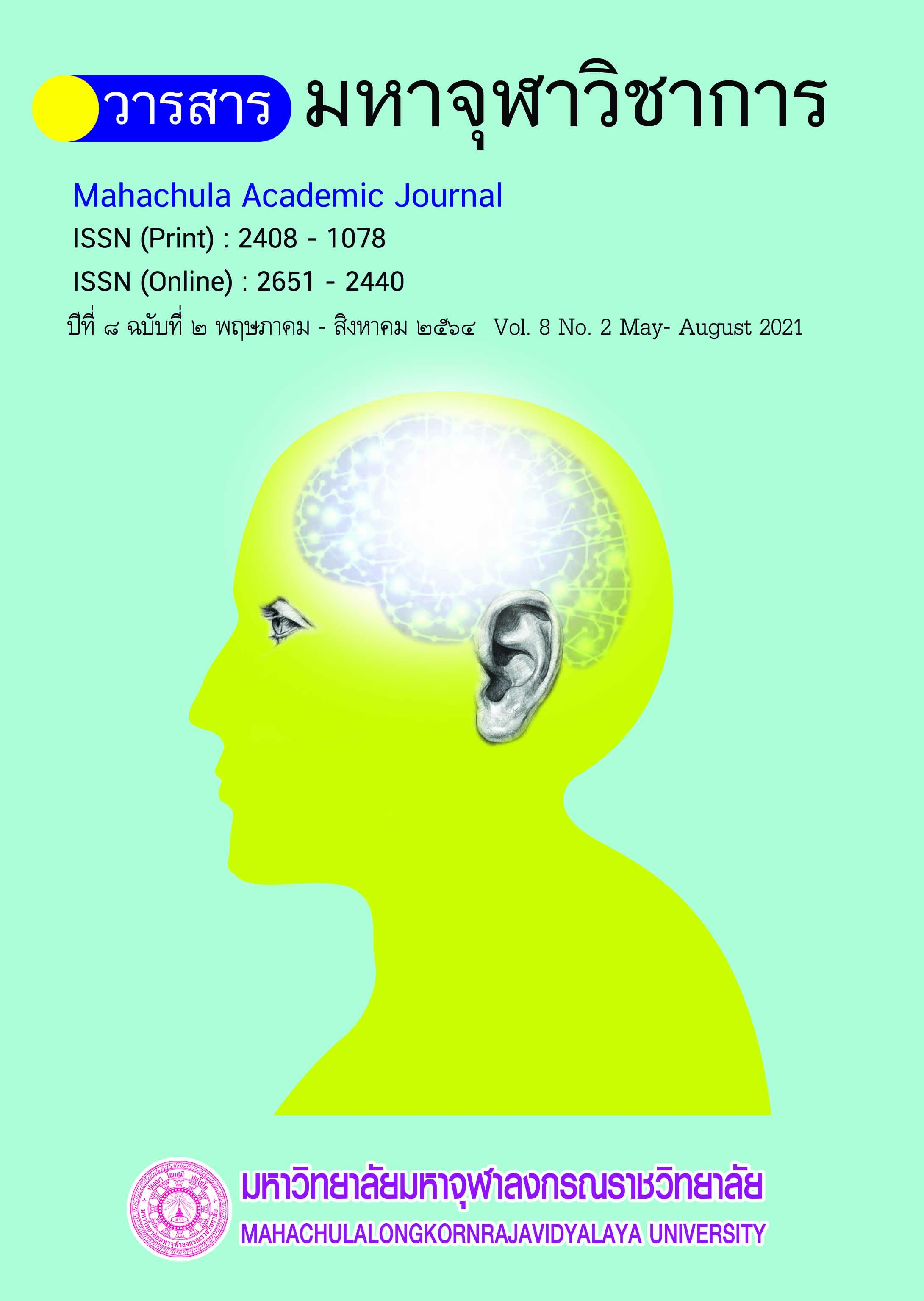The temple management model for learning center of The Community In Ayutthaya Province
Main Article Content
Abstract
The objectives of this research were (1) to study the component about temple management for learning center of the community, (2) to analysis general context of temple management for learning center of the community in Ayutthaya province and (3) to propose the model of the temple management model for learning center of the community in Ayutthaya province. This research was mixed method research comprising both documentary research and in-depth interviewing.
The research findings were as follows: (1) The principles for temple development were composed of Sangha affair administration 6 items as follows: Sangha administration, Sangha education, Buddhist propagation, Buddhist constructions and reparations, education support and Public welfare which all of every aspect of Sangha affair administration had been developed together with environment development, person, learning activity, and operational process by using the management principles including planning, organizing, staffing, directing and controlling. (2) The temple management model for learning center of the community in Ayutthaya province was as follows: first model, learning center for body development (Kāya Bhāvanā) that will be supported for people healthy according to Buddhism activities such as the temple ground - sport ground and the forest grow for royalty, second model, earning center for morality and social development (Sīla Bhāvanā) that will be supported for people to learn folk wisdom according to Buddhism activities such as project that plan to set folk wisdom museum within temple and the philosopher keep on folk wisdom and third model, learning center for mind development (Citta Bhāvanā) that will be supported people for meditation according to Buddhism activities such as project that plan to set meditation center in each province, merit and ethic camp. d) Learning center for Wisdom development (PanyaPavana) that will be supported people to search about Buddhism research with Buddhism activities such as project that plan to set Buddhism library, Buddhism exhibition. The key performance indicator was Percentage and satisfaction level of people participation.
Article Details
References
จุรีพร กาญจนการุณ. “การนำเสนอแนวทางการพัฒนาและการใช้ประโยชน์แหล่งการเรียนรู้ตลอดชีวิตในชุมชนเขตบางขุนเทียน”. ดุษฎีนิพนธ์ปริญญาครุศาสตรดุษฎีบัณฑิต สาขาวิชาพัฒนาศึกษา. บัณฑิตวิทยาลัย : จุฬาลงกรณ์มหาวิทยาลัย, ๒๕๔๖.
บุญส่ง หาญพานิช. “รูปแบบการบริหารจัดการความรู้ในสถาบันอุดมศึกษาไทย”. วิทยานิพนธ์ปริญญาครุศาสตรดุษฎีบัณฑิต สาขาอุดมศึกษา. ครุศาสตร์ : จุฬาลงกรณ์มหาวิทยาลัย, ๒๕๔๖.
พระครูนิวิฐศีลขันธ์ (ณรงค์ ฐิตวฑฺฒโน). “รูปแบบการพัฒนาทุนมนุษย์ตามหลักพุทธธรรมในองค์กรปกครองส่วนท้องถิ่น”. วิทยานิพนธ์ปริญญาพุทธศาสตรดุษฎีบัณฑิต สาขาวิชารัฐประศาสนศาสตร์. บัณฑิตวิทยาลัย : มหาวิทยาลัยมหาจุฬาลงกรณราชวิทยาลัย, ๒๕๕๗.
พระครูอุทัยกิจจารักษ์ (สุรางค์ สุจิณฺโณ). “รูปแบบการบริหารจัดการเผยแผ่พระพุทธศาสนาขององค์กรปกครองคณะสงฆ์ ภาค ๒”. วิทยานิพนธ์ปริญญาพุทธศาสตรดุษฎีบัณฑิต สาขาวิชาการจัดการเชิงพุทธ. บัณฑิตวิทยาลัย : มหาวิทยาลัยมหาจุฬาลงกรณราชวิทยาลัย, ๒๕๕๗.
พระมหาธฤติ วิโรจโน. “รูปแบบการพัฒนาพระสังฆาธิการเพื่อประสิทธิภาพการบริหารกิจการคณะสงฆ์”. วิทยานิพนธ์ปริญญาพุทธศาสตรดุษฎีบัณฑิต สาขาวิชารัฐประศาสนศาสตร์. บัณฑิตวิทยาลัย : มหาวิทยาลัยมหาจุฬาลงกรณราชวิทยาลัย, ๒๕๕๗.
พระราชวรมุนี (ประยุทธ์ ปยุตฺโต). บทบาทของพระสงฆ์ในสังคมไทยปัจจุบัน. หนังสือชุดหลักธรรมเฉลิมพระเกียรติเล่ม ๕๔/๖๐. กรุงเทพมหานคร : โรงพิมพ์การศาสนา, ๒๕๓๐.
พระราชวรมุนี (ประยุทธ์ ปยุตฺโต). สถาบันสงฆ์ในสังคมไทย. หนังสือชุดหลักธรรมเฉลิมพระเกียรติเล่ม ๕๓/๖๐. กรุงเทพมหานคร : โรงพิมพ์การศาสนา, ๒๕๓๐.
สำนักงานคณะกรรมการการศึกษาแห่งชาติ. พระราชบัญญัติการศึกษาแห่งชาติ พ.ศ.๒๕๔๒ และที่แก้ไขเพิ่มเติม (ฉบับที่๒) พ.ศ.๒๕๔๕. กรุงเทพมหานคร : โรงพิมพ์องค์การรับส่งสินค้าและพัสดุภัณฑ์, ๒๕๔๖.
สุมน อมรวิวัฒน์. วิถีการเรียนรู้ : คุณลักษณะที่คาดหวังในช่วงวัย. กรุงเทพมหานคร : พริกหวานกราฟฟิค จำกัด, ๒๕๔๖.
อดุลย์ วังศรี. “การสังเคราะห์งานวิจัยเกี่ยวกับกระบวนการเรียนรู้ ของชุมชนที่ทำให้ชุมชนเข้มแข็ง: การวิจัยเชิงชาติพันธุ์วรรณาอภิมาณ”. ดุษฎีนิพนธ์ปริญญาครุศาสตรดุษฎีบัณฑิต สาขาวิชาพัฒนาศึกษา. บัณฑิตวิทยาลัย : จุฬาลงกรณ์มหาวิทยาลัย, ๒๕๔๖.


